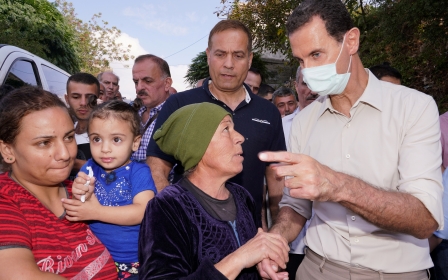US sanctions former Lebanon foreign minister Gebran Bassil
The United States has imposed sanctions on Gebran Bassil, the leader of Lebanon's Free Patriotic Movement (FPM) party founded by President Michel Aoun and allied with Hezbollah, the US Treasury announced on its website on Friday.
Bassil has been designated according to the Magnitsky Act, which authorises the US government to sanction individuals perceived as human rights offenders, freeze their assets and ban them from entering the US.
'The systemic corruption in Lebanon’s political system exemplified by Bassil has helped to erode the foundation of an effective government that serves the Lebanese people'
- US Treasury Secretary Steven Mnuchin
The Wall Street Journal reported on Thursday that US President Donald Trump's administration was due to impose the sanctions on Bassil for assisting Hezbollah.
The US deems Iran-backed Hezbollah to be a terrorist group and has sanctioned several Hezbollah members.
“The systemic corruption in Lebanon’s political system exemplified by Bassil has helped to erode the foundation of an effective government that serves the Lebanese people,” said Treasury Secretary Steven Mnuchin.
New MEE newsletter: Jerusalem Dispatch
Sign up to get the latest insights and analysis on Israel-Palestine, alongside Turkey Unpacked and other MEE newsletters
“This designation further demonstrates that the United States supports the Lebanese people in their continued calls for reform and accountability.”
The son-in-law of Lebanon's president, Bassil is also a former foreign minister.
Minutes after the Treasury's announcement, Bassil tweeted that he was not deterred by the sanctions.
"Neither the punishments frightened me nor the promises tempted me," he wrote. "I will not turn against any Lebanese, and I will not save myself for Lebanon to perish. I became accustomed to injustice and learned from our history: we are destined in this Orient to carry our cross every day ... to survive."
Though the US Treasury statement made no mention of Hezbollah, it cited many allegations of corruption over Bassil's time in government.
"Bassil has held several high-level posts in the Lebanese government, including serving as the minister of telecommunications, the minister of energy and water, and the minister of foreign affairs and emigrants, and Bassil has been marked by significant allegations of corruption," the statement said.
"In 2017, Bassil strengthened his political base by appointing friends to positions and purchasing other forms of influence within Lebanese political circles. In 2014, while minister of rnergy, Bassil was involved in approving several projects that would have steered Lebanese government funds to individuals close to him through a group of front companies."
In September, the US blacklisted two former Lebanese government ministers it accused of enabling Hezbollah.
Former transport minister Yusuf Finyanus and a former finance minister, Ali Hassan Khalil, were accused of engaging in corruption and leveraging their political power for financial gain.
Lebanon is currently attempting to form a new government tasked with pulling the country out of a spiralling economic crisis. It remains to be seen how Bassil's sanctioning will affect prime minister-designate Saad Hariri's efforts to form a cabinet.
Middle East Eye delivers independent and unrivalled coverage and analysis of the Middle East, North Africa and beyond. To learn more about republishing this content and the associated fees, please fill out this form. More about MEE can be found here.




